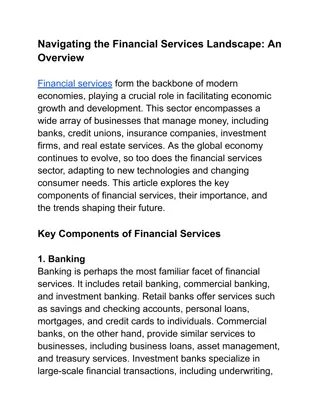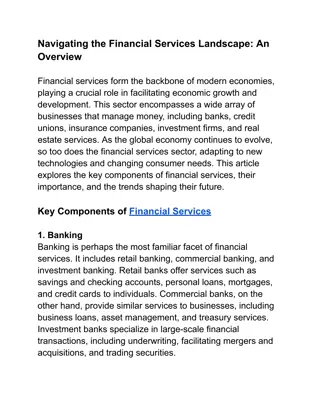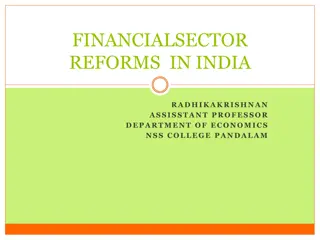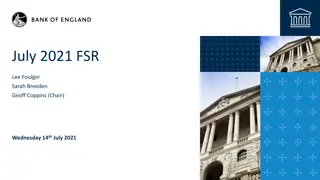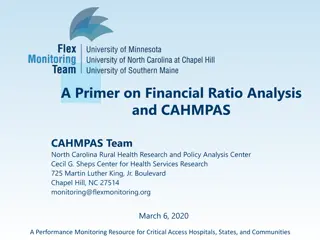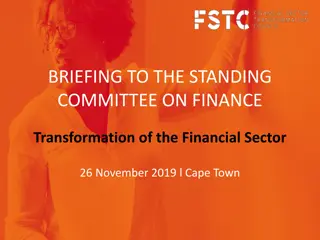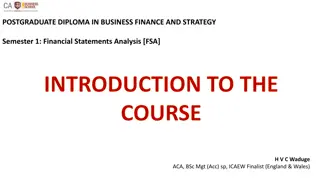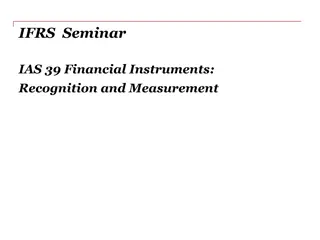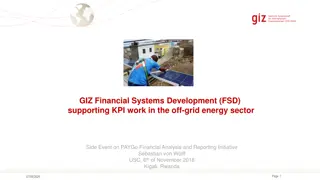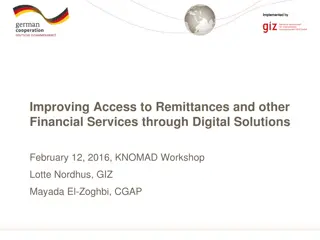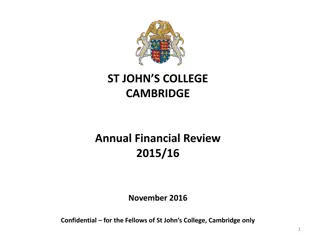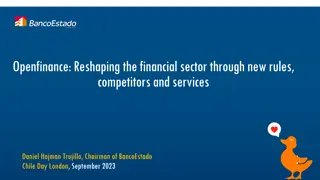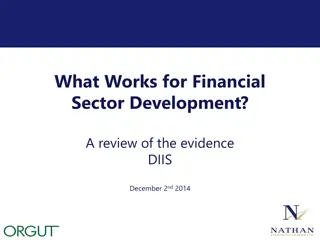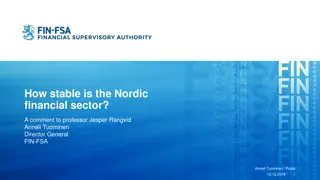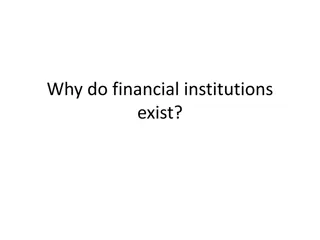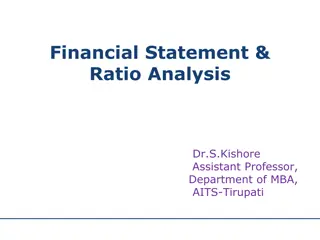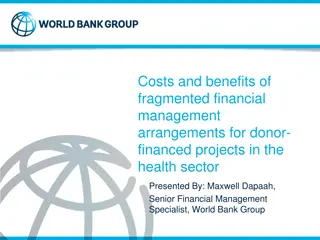Circular Flow in a Four-Sector Economy Explained
The circular flow in a four-sector economy involves households, firms, government, and the foreign sector. Each sector plays a crucial role in money flows and payments, contributing to the continuous flow of income. The financial market also has a significant impact on the economy by accumulating sa
3 views • 8 slides
National Financial Education Strategies and Best Practices
Financial education plays a crucial role in empowering individuals and ensuring financial system stability globally. The National Strategies for Financial Education (NFES) endorsed by the G20 have been adopted by approximately 100 countries. Different approaches such as stand-alone strategies, multi
5 views • 34 slides
Understanding Economic Activities and Their Classification
Economic activities encompass the production, distribution, and consumption of goods and services within a society. Economists classify economic activities into four main sectors: Primary, Secondary, Tertiary, and Quaternary, each with distinct roles and functions. The Primary Sector involves raw ma
7 views • 12 slides
How to achieve financial freedom in 5 years
Welcome to the Financial Freedom Challenge!\nAre you ready to take control of your financial future and unlock the door to lasting prosperity? Join us on a journey toward financial freedom like no other.\nWhat is the Financial Freedom Challenge?\nThe Financial Freedom Challenge is a transformative p
0 views • 9 slides
Navigating the Financial Services Landscape_ An Overview
Financial services form the backbone of modern economies, playing a crucial role in facilitating economic growth and development. This sector encompasses a wide array of businesses that manage money, including banks, credit unions, insurance companies, investment firms, and real estate services. As
0 views • 6 slides
Navigating the Financial Services Landscape_ An Overview
Financial services form the backbone of modern economies, playing a crucial role in facilitating economic growth and development. This sector encompasses a wide array of businesses that manage money, including banks, credit unions, insurance companies, investment firms, and real estate services. As
0 views • 5 slides
Understanding Financial Leverage and Its Implications
Financial leverage refers to a firm's ability to use fixed financial costs to amplify the impact of changes in earnings before interest and tax on its earnings per share. It involves concepts like EBIT, EBT, preference dividends, and tax rates, and can be measured through the degree of financial lev
1 views • 7 slides
Financial Empowerment through the Allstate Foundation Curriculum
Explore the Allstate Foundation's Moving Ahead Curriculum on financial empowerment, focusing on Module 4 that covers building financial foundations, loan options, and organizing financial paperwork. Understand the importance of loans, documentation, and financial records for establishing a strong fi
0 views • 25 slides
Financial Sector Reforms in India: An Overview
In the early 1990s, India witnessed significant reforms in its financial sector, addressing issues like lack of transparency, extensive regulation, and financial repression. Key reforms included setting up expert committees, reducing SLR and CRR, implementing prudential norms, and deregulating inter
0 views • 18 slides
UK Financial System Resilience and Support Overview
The UK financial system has shown strength in supporting households and businesses during the pandemic, and is well-equipped to provide continued assistance as the economy recovers. The banking sector remains resilient, with evidence of increased risk-taking in financial markets. Corporate sector de
0 views • 13 slides
A Primer on Financial Ratio Analysis and CAHMPAS
This resource by the CAHMPAS Financial Team at University of North Carolina provides an in-depth look into financial ratio analysis, including the theory, types of analyses, and the importance of understanding financial indicators. It discusses how businesses can assess their financial performance a
0 views • 87 slides
Understanding Circular Flow in a Two-Sector Economy with Financial Market
In a two-sector economy with a financial market, households and firms engage in savings, investments, and borrowing through the financial market, unlike the simple circular flow assumption where no savings are made. This interaction between households, firms, and the financial market plays a crucial
0 views • 4 slides
Understanding Public and Private Sectors in the Economy
The public sector, private sector, and joint sector play crucial roles in the economy. Public sector includes government services and enterprises, while private sector focuses on profit-making activities. Private sector contributes significantly to national income, generates employment, and ensures
0 views • 20 slides
Albanian National Financial Education Strategy 2022-2027
The Albanian National Financial Education Strategy (NFES) aims to promote financial education for individuals, households, and MSMEs to enhance financial well-being and economic stability. It focuses on key interventions, foundational enablers, institutional coordination, funding, and monitoring. Fi
0 views • 19 slides
Transformation of the Financial Sector: Briefing to the Standing Committee on Finance
The briefing presented on 26 November 2019 in Cape Town highlighted the transformation of the financial sector, focusing on the implementation of recommendations, updates to the Financial Sector Code, and the way forward. It included the rebranding to the Financial Sector Transformation Council, the
0 views • 17 slides
Understanding Financial Statements Analysis in Business Finance
Understanding the analysis of financial statements is crucial for assessing the financial performance and position of an organization. This course provides knowledge, competencies, and skills necessary to apply basic financial statement analysis techniques, interpret financial numbers, and generate
0 views • 18 slides
Understanding IAS 39: Financial Instruments Recognition and Measurement
This content provides an overview of an IFRS seminar on IAS 39, focusing on key concepts such as the classification and measurement of financial assets, impairment, reclassification, and more. It covers definitions of financial instruments, financial assets, equity instruments, and financial liabili
1 views • 43 slides
Private Sector Engagement in Climate Solutions for Agriculture Sector
Explore opportunities for private sector engagement in delivering climate solutions in the agriculture sector to meet NDC/NAP ambitions, including panel discussions with various actors and investors, highlighting emerging investment opportunities and barriers hindering funding towards climate-relate
2 views • 4 slides
Financial Systems Development (FSD) Supporting KPI Work in Off-Grid Energy Sector
Explore the initiatives of GIZ in promoting complex reform and change processes in the off-grid energy sector, including financial analysis and reporting. The Financial Sector Development (FSD) projects in various countries showcase efforts to support stability, green finance, microfinance, SME fina
2 views • 8 slides
Enhancing Private Sector Engagement in GEF Projects Towards Sustainable Development
Expanding private sector engagement in GEF projects is crucial for leveraging funding, expertise, innovation, and technology transfer. Through partnerships with various private sector actors, GEF aims to address environmental challenges effectively and promote sustainable business models. Reflection
2 views • 13 slides
Enhancing Financial Inclusion Through Digital Solutions
This project, implemented by GIZ with funding from the German Federal Ministry for Economic Cooperation and Development, aims to improve access to digital payments and financial services for refugees and low-income Jordanians. Key objectives include increasing the usage of digital financial services
0 views • 11 slides
Understanding Financial Abuse and Building Healthy Financial Relationships
Explore the impacts of financial abuse within relationships and learn about elements of a healthy financial partnership. Gain insights into recognizing signs of financial abuse, establishing financial safety, and fostering equality in decision-making. Understand how financial empowerment plays a vit
0 views • 30 slides
Financial Services Sector Overview: Max M. Fisher College of Business Presentation
Sector presentation on Financial Services by William Quirk, Nick Stamatis, Sharon Tong, and Carolina Tovar from Max M. Fisher College of Business. The presentation covers the market size, performance, industries, top companies, and business analysis of the sector. It highlights the sector's performa
0 views • 36 slides
Analyzing Systemic Climate Risk in the Financial Sector
This study discusses systemic climate risk in the financial sector by examining the effects of climate risks on financial institutions. It aims to design a market-based framework to assess the vulnerability of financial institutions to climate risks and analyze potential contagion effects. The frame
0 views • 39 slides
St. John's College Cambridge Annual Financial Review 2015/16 - Summary and Analysis
This confidential Annual Financial Review for the Fellows of St. John's College, Cambridge provides detailed insights into the financial performance and outlook for the year 2015/16. It covers the income, expenditure, endowment, and school finances of the College group. The review discusses the oper
0 views • 35 slides
Private Sector Role in Health Financing in West Africa
DPs in West Africa recognize the private sector's potential role in healthcare financing. Current collaborations involve support from USAID, WB, BTC, SDC, and others to strengthen private sector involvement in delivering health services, financial flows management, and decision-making towards Univer
0 views • 9 slides
Reshaping the Financial Sector: The Open Finance/Fintech Promise
Openfinance is revolutionizing the financial sector through new rules, competitors, and services. The Open Finance/Fintech promise globally focuses on inclusion, democratization of financial services, innovation, and quality. Traditional banks and fintech companies in Chile are bridging gaps in fina
0 views • 4 slides
Financial Sector Development: Evidence and Strategies
Reviewing the evidence on financial sector development reveals that stable institutions, effective policies, and proper support functions are crucial for financial deepening, inclusion, and long-term finance. Strong evidence suggests that macro stability, liberal policies, and efficient regulations
0 views • 13 slides
Overview of Nordic Financial Sector Stability
The stability of the Nordic financial sector has been examined in relation to past crises and indicators like rapid credit growth and house prices. While the current situation seems stable, risks remain, especially with low interest rates impacting households and banks. Lessons from the 2008 crisis
0 views • 8 slides
Financial Literacy Empowerment in Eastern and Southern Africa
Developing countries in Eastern and Southern Africa are prioritizing financial education to empower consumers in making sound financial decisions. Financial literacy enhances financial inclusion, stability, and economic growth. It involves awareness, knowledge, skills, attitudes, and behaviors essen
0 views • 23 slides
Understanding Why Financial Institutions Exist
Financial institutions exist to provide crucial services like intermediation, risk management, and facilitating economic activities by connecting savers and borrowers. The global financial structure involves various institutions like banks, insurance companies, and securities markets. Key facts incl
0 views • 45 slides
Understanding Financial Statement and Ratio Analysis
This informative content discusses the importance of financial statement and ratio analysis in assessing a firm's past, present, and future financial conditions. It covers the primary tools used, such as financial statements and comparison of financial ratios, as well as the objectives of ratio anal
0 views • 35 slides
European Developments in Public Sector Accounting: Lessons Learned
This presentation delves into the sovereign debt crisis in Europe, highlighting its causes and lessons learned. It discusses the role of the public sector in relation to the private sector's performance, the impact of political systems on public sector accounting reforms, and the need for a harmoniz
0 views • 18 slides
Financial Literacy and Education Commission: Coordinating Federal Efforts
Financial capability empowers individuals to manage financial resources effectively, make informed choices, avoid pitfalls, and improve their financial well-being. The Financial Literacy and Education Commission (FLEC) works to improve the financial literacy of individuals in the United States throu
0 views • 16 slides
Challenges and Opportunities in Health & Social Care Sector
The Health & Social Care sector is facing key skills challenges such as doing more with less, attracting talented individuals, and addressing skills shortages. The sector plays a crucial role in providing services like residential care, hospital activities, social work, and more. With an aging popul
0 views • 24 slides
Costs and Benefits of Fragmented Financial Management in Health Sector Projects
The study explores the costs and benefits of fragmented financial management arrangements for donor-financed projects in the health sector. It emphasizes the importance of open and orderly Public Financial Management (PFM) systems in achieving desirable outcomes and discusses strategies to minimize
0 views • 15 slides
Health Sector Review and SWAp Evaluation in Mozambique
Joint Annual Health Sector Review and Sector-Wide Approach evaluation in Mozambique focus on assessing the performance of the health sector, enhancing communication between Ministry of Health and partners, and ensuring consistency and credibility of health sector information over the years. The proc
0 views • 9 slides
Stock Recommendation for Autumn 2021 - Sector Overview and Analysis
Materials Sector overview and analysis for Autumn 2021, including SIM Holdings & Allocation, Sector Performance, Business Cycle analysis, External Factors affecting the sector such as COVID-19 impact and supply chain issues, and Supply and Demand dynamics. The report discusses the current state of t
0 views • 34 slides
Exploring Job Opportunities in Different Sectors and Industries
Discover various job application strategies based on sector (Private, Public, Non-Profit), industry (Education, Healthcare, Construction, Business, etc.), and level (Entry-level, Specialized, Leadership). Learn where to find specific job postings, whether on job aggregators, sector-specific boards,
0 views • 11 slides
Advancing Inclusive Energy Sector Through Sector Reforms
The role of the electricity transmission utility in building an inclusive energy sector for a sustainable future is crucial. Sector reforms have led to the restructuring of the electricity supply industry in Ghana, promoting efficient supply of competitively priced electricity driven by private sect
0 views • 10 slides




